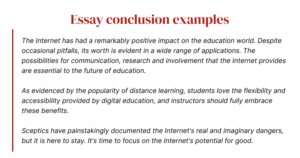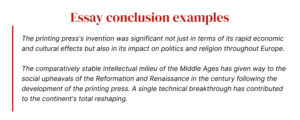You’ve almost completed the task. You’ve polished your introduction and thesis. You’ve taken the time to do research and prove all of your supporting points. You are nearing the end of your essay when you abruptly freeze up, realising that it is high time to craft the conclusion.
Conclusions are frequently regarded as the most challenging part of an essay writing process. Nevertheless, they are one of the most essential aspects of the paper as they bring clarity and insight into the topic under study.
In this article, we will explain how to write a conclusion paragraph for an essay, what to include and avoid while writing one and provide examples of effective conclusions.
This may all seem quite complicated for beginners (and it is), so let’s start with the basics first.
What is a conclusion in an essay?
A conclusion is the final thought in any paper, including an essay, in which you are required to evaluate whether you managed to fulfil the writing tasks and achieve the set goals. It has to reaffirm your answer to the essay question, provide a summary of the key arguments you discussed throughout the work and offer a final impression of the central idea. This last impression has to contain the story’s moral or a revelation of a profound truth.
A good conclusion for essay will wrap up all final thoughts and main points and combine the relevant information with emotional appeal for your ending statement to resonate with the reader.
What are the characteristics of solid concluding sentences for essays?
Ideally, your conclusion should include the following:
1. Explanation of why your argument matters.
Whatever the nature of your essay, your concluding paragraph has to go over the thesis statement and supporting ideas to demonstrate why your research is vital.
In contrast to your introduction, which focuses on a specific problem, your conclusion should concentrate on the more significant implications of the research.
2. Connection of the main points.
Your conclusion should not just restate the key points of the essay. It should be a summary that connects your thoughts and shows how they fit together to form a bigger picture.
Consider broader context while writing your conclusion, and be sure to comment on the significance of your findings.
3. A sense of completeness.
Your final paragraph is also an opportunity to respond to the “so what?” question. Make sure you answer it and give your reader a sense of closure by providing a solution or insight that will urge them to think about how the subject can affect them and why they should care.
4. A strong last impression.
Final impressions are just as crucial as the initial ones. That is why you must ensure your closing statement is meaningful to your audience. It doesn’t have to be a great manifesto, but your concluding part should help readers see things from a new perspective.
What your conclusion in an essay should not include?
When writing a conclusion for an essay, there are a few things you should definitely avoid, as they will only weaken your overall argument. These things are as follows:
- Phrases such as “in summary,” “to sum up” and “in conclusion.” Readers are well aware that they are reading the concluding part and do not require a clue.
- A summary of what was stated before. You don’t have to repeat all of your supporting points, either. Readers will definitely notice if you copied and pasted from somewhere else.
- Introducing new evidence or ideas. This will only weaken your arguments and confuse your readers. If you have reached a profound point and want to incorporate it in your conclusion, you’d better add it to one of your supportive paragraphs.
You might also find useful: Personal statement help
How to start a conclusion in an essay?
Wondering how to write a conclusion for an essay? It all comes down to using the below conclusion structure.
1. Include a topic sentence.
At the beginning of your conclusion, add a topic sentence restating your thesis statement from the introductory paragraph. In general, it should remind readers about the objectives and key arguments of the essay.
Keep your topic sentence brief and include only the most essential information. Your goal is to return to your argument without adding any new ideas.
2. Summarise the critical points.
Your conclusion should summarise all of the important ideas in your paper and demonstrate how they add to the subject matter. Connect each point and discuss their cause and effect or other relationships while showing how they add up as an overall coherent whole.
Remember, you should only use the supporting arguments and data you offered in your essay’s body.
3. Make a reference to your introduction.
Another crucial step in how to close an essay decently is to keep your introductory paragraph in mind. The best conclusions frequently unite the opening and closing paragraphs into a single whole.
For instance, you can break down your storytelling and incorporate it in your introduction and conclusion.
4. Appeal to emotions.
Emotional conclusions are effective. The use of sensory language and impactful phrases will assist you in creating a memorable image in the minds of your readers. You can also achieve this by including an inspiring or powerful quote from one of your primary or secondary sources.
5. Provide insights.
Though you may have discussed the contributing factors and emphasised the significance of the subject matter, your conclusion should not end there. Give readers a powerful takeaway or tell them about the next steps. This can be a solution to a problem, a valuable lesson or anything in between.
Be genuine, relate with your audience and make a simple start on how each person may immediately deal with the issue at hand.
6. Always end with a closing sentence.
The best endings are those that read like one. Your very last sentence should contain the concluding idea that wraps up your entire piece and leaves readers with a powerful impression of your work.
A good idea is to include linking words indicative of a conclusion, such as “for this reason” or “therefore.”
3 awesome ways to end an essay
There are a lot of ways to conclude an essay, but the most effective ones are as follows:
1. Rhetorical question.
Addressing the reader is a brilliant move. It will make you think about the essay’s topic and free you from the need to offer precise facts at the end of the text. Consider what question you can ask and how you can approach it smoothly.
Keep in mind that perfect words can be found on practically any topic.
2. Link to the introduction.
This is easy to do if you’ve included a question in the introduction. Simply answer it in your concluding paragraph! Alternatively, you can utilise the exact phrase in your first and last paragraphs. However, you should colour it differently emotionally at the expense of proper thought development. In the opening paragraph, it should set the tone for the entire paper and intrigue the reader, while in the end, it has to serve as a conclusion.
3. Quote.
Of course, bringing in an entire paragraph is not the most attractive solution. However, using it as the final line or phrase is completely fine. Furthermore, an exact quotation skillfully integrated within the text does not necessitate any explanation or continuation.
An elegant move will also be to include the same author’s words in the introduction.
Now that you know how to end an essay in the most effective manner, let’s take a look at some great examples of essay conclusions.
Compelling essay conclusion examples
Example 1:
This conclusion was taken from an argumentative essay on the impact of the Internet on education. It acknowledges opposing viewpoints while presenting a firm stance.

Example 2:
This conclusion was taken from a brief expository essay about the printing press’s invention and its consequences for European society. It focuses on providing a clear overview of the essay’s main points.

The takeaway
No winning essay can exist without an effective conclusion. It not only brings everything to a close, but it can also make for a powerful takeaway that the reader will remember. So, keep the above roadmap in mind when writing your next concluding paragraph for an essay; excellent results are guaranteed!
Should you need any assistance with this part of an essay, don’t hesitate to hire a UK essay writer at royalessays.org, a professional paper writing service trusted by thousands of domestic and international students pursuing their degrees in Great Britain. Our experts are well-versed in essay writing best practices and will gladly lend you a hand at any time of the day or night!

